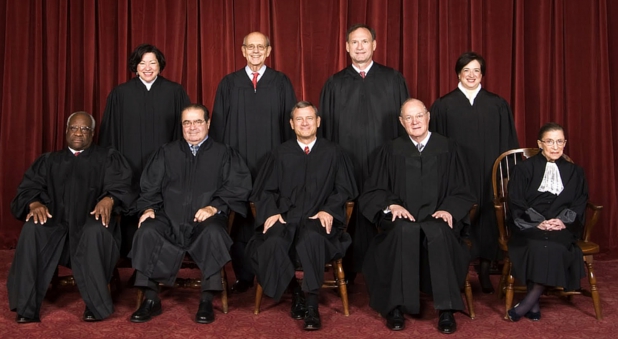The Supreme Court—the last stop for condemned prisoners such as Scott Panetti, a Texan who is mentally ill—appears increasingly wary of the death penalty.
In May, the justices blocked the execution of a Missouri murderer because his medical condition made it likely that he would suffer from a controversial lethal injection.
Later that month, the court ruled 5-4 that Florida must apply a margin of error to IQ tests, thereby making it harder for states to execute those with borderline intellectual disabilities.
In September, a tipping point on lethal injections was nearly reached when four of the nine justices sought to halt a Missouri prisoner’s execution because of the state’s use of a drug that had resulted in botched executions elsewhere.
And in October, the court stopped the execution of yet another Missouri man over concerns that his lawyers were ineffective and had missed a deadline for an appeal. The justices are deciding whether to hear that case in full.
Now, on top of drug protocols, developmental disabilities and attorneys’ mistakes, the court must decide in Panetti’s case whether mental illness should be another reason to keep prisoners alive.
“There’s frustration on the part of at least some of the justices about the death penalty, and what to do about it,” said Richard Dieter, executive director of the Death Penalty Information Center.
At least three justices—Antonin Scalia, Clarence Thomas and Samuel Alito—consistently vote against blocking state executions. Chief Justice John Roberts and Justice Anthony Kennedy usually line up with them.
The court’s four liberals — Ruth Bader Ginsburg, Stephen Breyer, Sonia Sotomayor and Elena Kagan — have shown the most hesitation or opposition. Ginsburg said in September that capital punishment cases have been the “most troubling” of her 21-year career on the court.
Kennedy joined the liberals in May, writing the court’s opinion in Hall v. Florida that struck down overly rigid IQ test requirements. “Intellectual disability is a condition, not a number,” Kennedy wrote.
While the court has yet to hear a case on the ethics of lethal injections, it has moved toward the liberals’ position in recent years on issues of mental capacity.
In Atkins v. Virginia (2002), the court ruled 6-3 that executing people with intellectual disabilities violated their Eighth Amendment rights against cruel and unusual punishment. This year’s ruling in Freddie Lee Hall’s case fine-tuned that decision.
In Roper v. Simmons (2005), the court ruled 5-4 that juveniles who were under age 18 when they committed their crimes are not eligible for the death penalty. It since has limited the use of life without parole for juvenile offenders as well.
The court’s precedent on mental illness dates back to 1986, when it ruled in Ford v. Wainwright that prisoners must be deemed mentally competent before being executed. Determining competency was left up to the states, however.
“It’s difficult to define mental illness, whereas it’s easier to define mental retardation and quantify it,” Dieter says. “Mental illness is one area where they could really open up a whole new exemption.”
See an error in this article?
To contact us or to submit an article






















